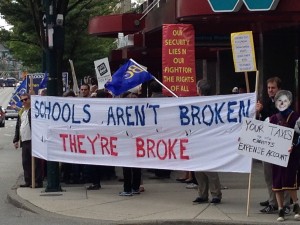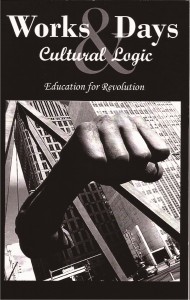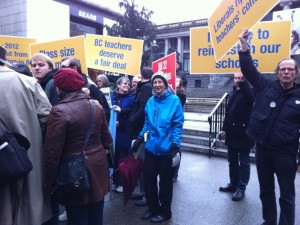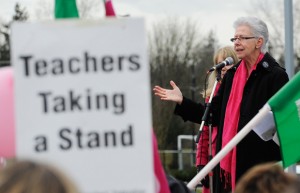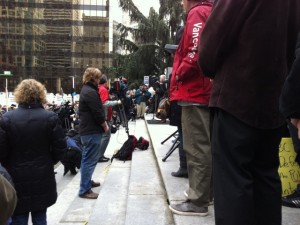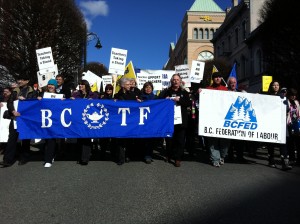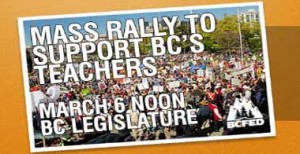The BC NDP may have ‘snatched defeat from the jaws of victory’, but education is one of the biggest losers in this week’s election of the fourth consecutive Liberal majority government in the province. In addition to education, the handful of biggest losers in the election includes labour, students, youth, and the increasing volume of people scraping to get by in general.
With more than a decade of labour disputes over the Liberals’ irresponsible and often careless bargaining practices, the BC Teachers’ Federation is now bracing once again to enter the fray of contract negotiations. The past dozen years of degraded labour relations included a range of arbitrations and trips to courts to stave off the Liberals’ intentions of stripping bargaining rights from teachers and alarming erosions of their academic freedom and civil liberties writ large.
Blind to the stunning turn of election fortunes this week, universities in the province were holding their breath for the NDP’s promises to invest millions in education. Flush in the face, now there is not much more for the Presidents to do but go begging for more or just morph into real estate, as UBC has, and build more, oh yes, and raise tuition. In the backyard of the provincial legislature, the University of Victoria is cutting staff and raising tuition once again.
Actually, most universities in the province, such as UBC, raise tuition 2% annually to build on the students’ backs. Smarting from the trend, students are realizing that they are “paying significantly more” and “getting less,” as Melissa Moroz of the Professional Employees Association observed. Students are also waking up to the hard facts of the fictitious economy presented to them in low res 3D: the job market for youth is actually the worst in decades and sinking to new lows. Indicators for the summer 2013 summer job market point to bleak months ahead while university graduates are left praying and hoping for mere job ads as jobs for University grads become the stuff of the past. Education PhDs, for example, anxiously open the CAUT Bulletin and University Affairs month after month only to find blank columns and a job ad section less than full enough to fold a single paper airplane.
Meanwhile back on the mainland, students at Capilano University are burning and destroying their artwork in protest of impending cuts of entire arts programs. This past year, strikes and other forms of labour action at SFU and UBC marked the sign of the times of universities, over-extended and under-funded, unable or unwilling to pay fair wage increases. Next month begins an arbitration between the Faculty Association of UBC and the University to settle a contract bargaining dispute now in its second year. There isn’t much to bargain for or with, as for the Liberals, the universities’ staff, students, and faculty remain net zero workers.
Politics in British Columbia: 14 May election results.
What happened? With all due respect NDP (and I voted NDP), please quit the laughable fiction suggesting that their negative campaign simply overshadowed our positive campaign–their power out-spun our truth. For sure, the NDP was out-campaigned and badly so. Out-witted and out-strategized would be other ways of describing this. What’s worse than a Liberal? A smug Liberal. But hey, at least we have the Vancouver-Point Grey and Vancouver Fairview ridings, two of the few flies on the windshield of that ostentatious red parade float!
Visibly fussed the day after the election, the best the NDP could muster up was the simplistic negative v positive excuse. Even some among the left press, such as The Georgia Straight, could find nothing to say but to parrot the NDP: “It’s sad, but negative politics rule” the Straight began its “NDP Grapples with Stunning Loss” story. NDP candidate George Chow, who went down in defeat in the Vancouver-Langara riding, decried that they lost because “negativity works.” George Heyman, who displaced the Liberal Minister of Health in the Vancouver-Fairview riding went as far as to mystifyingly say that the Liberals’ “negative campaign” “turns people off.” One does not have to be a strategy or policy wonk to know that the Liberals hardly ran a negative campaign and those who argue they did appear clueless, or more generously are understandably squeezing sour grapes from what’s left of the BC NDP’s election machinery. A federal NDP MP joined in nonetheless: the Liberals’ victory “shows the power of negative politics,” he said. C’mon now, who are we trying to kid? The ridings that went red and went to the Liberals– nay, all of us–deserve a believable and better explanation from the NDP for what happened on election day.
What happened? Is not BC a conservative province and the Liberals just as well neoliberals or neocons? Isn’t liberalism and neoliberalism basically the same at this point in time? The glove fits the hand that feeds business, if not business as usual. We know that Canada as a whole has become quite comfortably conservative. In BC, Gordon Campbell brought the Liberals to victory in 2001 and the province took a right turn that obviously sits right with a majority of the people. In this week’s election on 14 May, there were pockets of ‘vote the bums out’, such as in my riding where we did vote out the Liberals’ very astute strategist and standing Premier Christy Clark. But for the most part, if you lean left toward NDP, election night sadly trended from ‘vote the bums out’ to ‘vote the bums in’.
Now, as #IdleNoMore confronts #IdleForeverMore, it is going to be an interesting four more years in BC.


 Follow
Follow